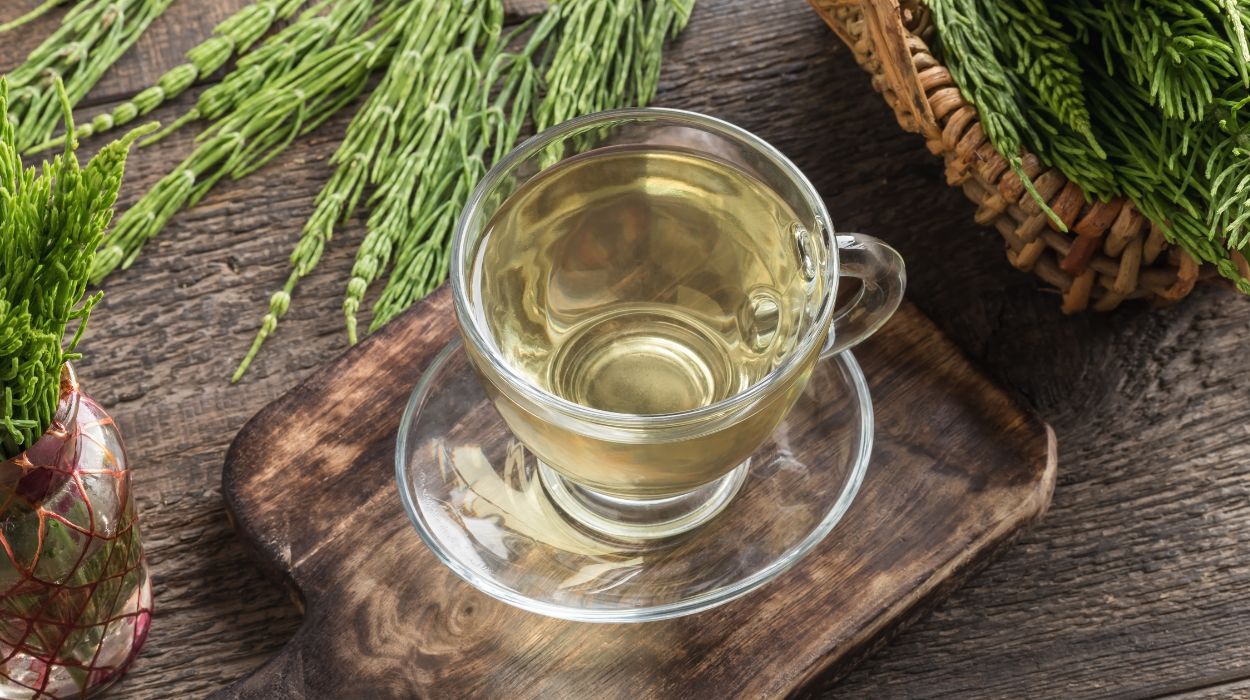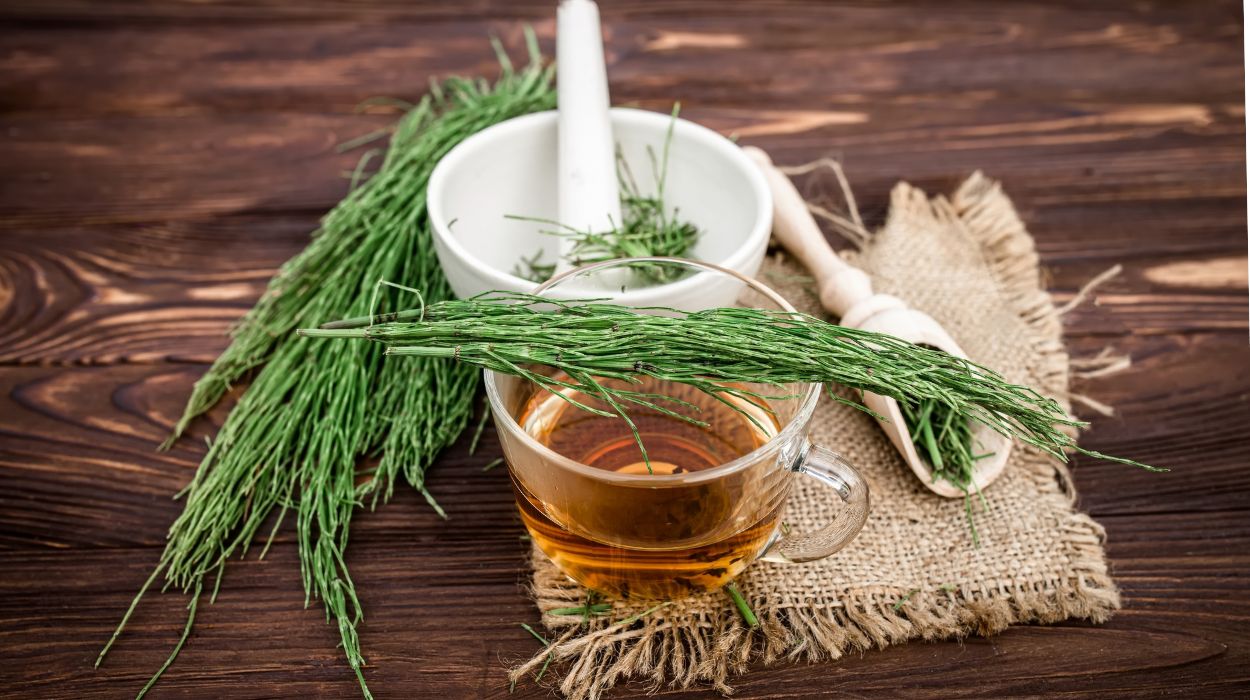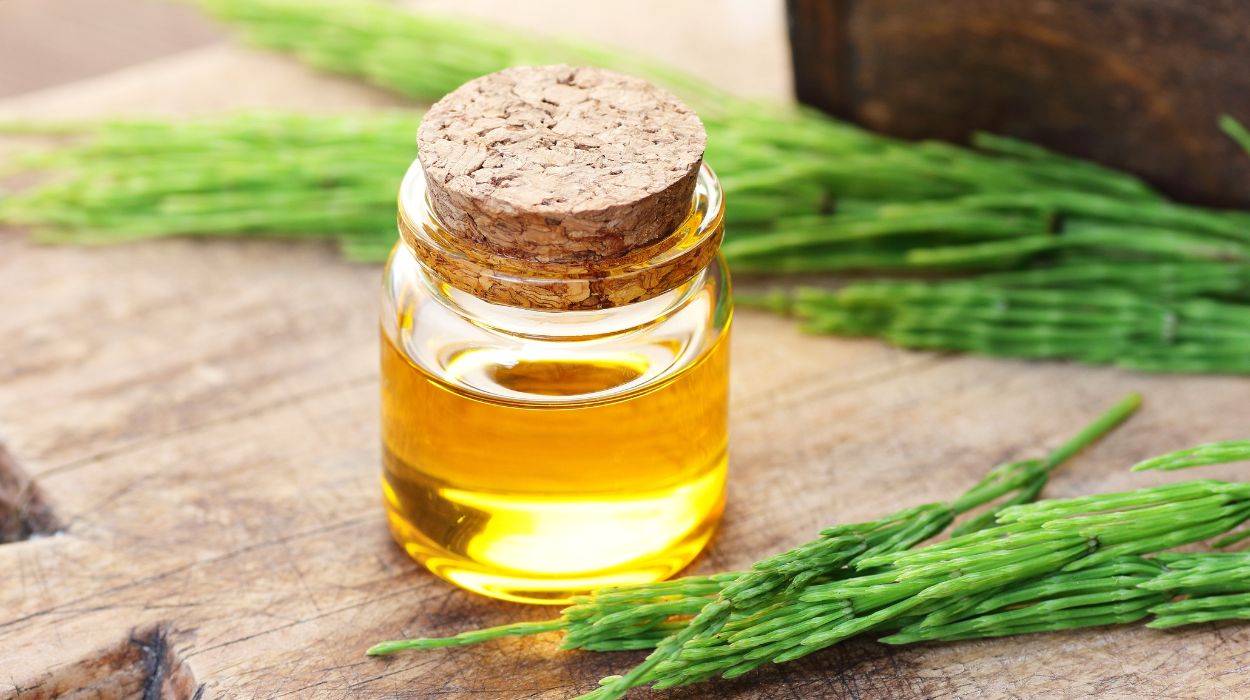 Expert's opinion
Expert's opinion
Expert's opinion
The article is a subjective view on this topic written by writers specializing in medical writing.
It may reflect on a personal journey surrounding struggles with an illness or medical condition, involve product comparisons, diet considerations, or other health-related opinions.
Although the view is entirely that of the writer, it is based on academic experiences and scientific research they have conducted; it is fact-checked by a team of degreed medical experts, and validated by sources attached to the article.
The numbers in parenthesis (1,2,3) will take you to clickable links to related scientific papers.
Horsetail For Hair: Benefits & How To Use For Hair Growth In 2024

Many people strive to avoid thinning hair and achieve healthy, luscious hair. In pursuing this goal, they often turn to various natural remedies. One such remedy gaining popularity is horsetail.
Known for its rich nutrient content and potential benefits for hair growth, the horsetail plant has been used for centuries in traditional medicine. If you have thinning hair, try horsetail alongside other evidence-based methods to strengthen your hair.
In this article, we will explore what horsetail is, the benefits of horsetail for hair, how to use horsetail for healthy hair growth, and important precautions to remember.
Benefits Of Horsetail Extract For Hair
- Rich in silica.
- Nourishes hair follicles.
- Adds shine and luster.
- Stimulates hair growth.
Horsetail Benefits For Hair
Despite the sparse evidence, horsetail might benefit hair as it:
Is Rich In Silica
Silica, a silicon compound found abundantly in horsetail, promotes hair growth[1] and strengthens hair follicles. Silica contributes to the production of collagen, a protein that helps maintain the structural integrity of hair strands, leading to stronger and healthier hair.
Drinking horsetail tea significantly increases serum silicon levels and might protect against[2] thinning hair.
Nourishes Hair Follicles
Horsetail contains minerals and antioxidant phytonutrients. Studies suggest that phytonutrients can inhibit oxidative damage[3] and nourish the hair follicles,[4] promoting healthier hair growth.
Although there’s no direct evidence, the antioxidants in horsetail are thought to promote healthier hair follicles, ensuring optimal conditions for hair growth.
Adds Shine And Luster
Regular use of horsetail for hair can enhance the shine and luster of your locks. The minerals in horsetail help seal the hair cuticles, resulting in smoother and more radiant hair.
Stimulates Hair Growth
Horsetail possesses natural anti-inflammatory properties[5] that might help reduce oxidative stress and inflammation on the scalp. By maintaining a healthy scalp environment, horsetail promotes hair growth[6] and may help reduce hair loss.
What Is Horsetail?
Common horsetail grass is a unique plant used for centuries in traditional medicine. It is often called horsetail due to its resemblance to a horse’s tail.
This ancient plant is revered for its potential health benefits and is a rich source of various bioactive compounds,[7] including silica, flavonoids, phenolic acids, and alkaloids. Silica is a key nutrient in horsetail and is believed to contribute to its hair care properties.
Horsetail is usually consumed as a tea but can also be found in hair supplements. It might be considered a superfood for hair because it is rich in essential minerals. In particular, calcium, potassium, and iron play a vital role in reducing hair loss and maintaining healthy hair. However, there is a lack of strong scientific evidence for horsetail’s effects on promoting hair growth and overall health.
Is Horsetail Good For Hair Growth?
Horsetail has been traditionally used for hair growth due to its high silica content, which is believed to promote healthy hair. However, scientific evidence supporting its effectiveness is limited. While silica is important for hair health, there is insufficient research to conclude that horsetail alone can significantly stimulate hair growth. Other factors like genetics, overall health, and proper hair care play crucial roles. If you’re considering horsetail as a hair growth remedy, it’s advisable to consult with a healthcare professional to get personalized advice and explore other proven options for promoting hair growth.
How To Use Horsetail For Hair Growth
Horsetail Tea For Hair

Horsetail tea can be an excellent way to harness the benefits of this herb for hair growth. You can either consume the tea or use it directly on your hair and scalp as a hair rinse.
Horsetail Oil For Hair

Horsetail oil can be easily prepared at home or purchased from health stores. Horsetail oil can be used in shampoos, as a hair rinse, in tea infusions, or taken in capsules.
Horsetail Extract Supplements
Horsetail plant extract supplements are available as capsules or tablets. However, it’s important to consult a registered dietitian before incorporating new supplements into your routine to ensure they suit you.
Precautions When Using Horsetail For Hair
While horsetail has many potential benefits for hair growth, it’s essential to exercise caution when using it. Here are a few precautions to keep in mind:
- Consult a professional: Before incorporating horsetail into your hair care products or routine, it’s wise to talk to a registered dietitian or a qualified herbalist. They can provide personalized guidance based on your needs and underlying health conditions.
- Avoid excessive use: Like any herbal remedy, moderation is key. Horsetail contains a compound called thiaminase, which can break down thiamine – otherwise known as vitamin B1. Prolonged and excessive use of horsetail supplements may lead to thiamine deficiency,[7] so following recommended dosages and durations is essential.
- Allergies and sensitivities: Some individuals may have allergies or sensitivities to horsetail. It’s important to perform a patch test before using horsetail products to check for adverse reactions. Horsetail also contains small amounts of nicotine,[8] so avoid it if you have a nicotine allergy. If you experience any discomfort or allergic symptoms, stop using it at once and seek medical advice.
- Pregnancy and breastfeeding: Pregnant or breastfeeding individuals should avoid using horsetail due to its potential diuretic properties.[7] It’s always best to consult with your doctor to determine what is safe for you during this time.
- Check the quality and source: Herbal supplements are not regulated in the United States, and the quality can vary, so it’s important to choose a trusted brand. Research the brand or supplier and check for third-party testing or certification seals on the label to ensure the purity and safety of the product.
- Interactions with medications: Horsetail contains various active compounds that may interact with certain medications,[9] including diuretics, lithium, blood-thinning medications, and HIV treatments.[10] If you are taking any prescription drugs or have underlying health conditions, consult your healthcare professional to determine whether horsetail is safe to use with your current treatment plan.
- Duration of use: Using horsetail for a prolonged period without breaks may not be advised due to a lack of evidence and the potential for side effects.
Potential Side Effects
While horsetail is generally considered safe when used as directed, over-consumption or prolonged use can result in side effects such as:
- Gastrointestinal issues.
- Vitamin B deficiency.
- Thiaminase toxicity.
- An imbalance of minerals in the body.
- Increased urination.[7]
- Lowered blood pressure.[11]
It’s important to note that while horsetail has a long history of traditional use, scientific research on its effectiveness and safety is limited. Be mindful of your body’s response to horsetail, and discontinue use if you experience harmful effects.
The Takeaway
Incorporating horsetail into your hair care routine may provide you with desired hair growth results. However, it’s crucial to approach herbal remedies carefully and be mindful of any precautions associated with their use. With proper precautions, horsetail could be a natural solution to promote healthy, beautiful hair.
While horsetail may offer certain potential health benefits for hair, more research is needed to fully understand its effects and safety profile. Remember, everyone’s hair is unique, and results may vary. If you have any concerns or questions, it’s always best to seek advice from a healthcare professional or a qualified herbalist.
If you are suffering from hair thinning, try other hair supplements to promote new hair growth. Other supplements for hair include vitamin C, which can help stimulate collagen production, and B vitamins, such as folic acid.
+ 11 sources
Health Canal avoids using tertiary references. We have strict sourcing guidelines and rely on peer-reviewed studies, academic researches from medical associations and institutions. To ensure the accuracy of articles in Health Canal, you can read more about the editorial process here
- Advincula, L., Addor, F. and Berardo, M. (2016). Use of silicon for skin and hair care: an approach of chemical forms available and efficacy. Anais Brasileiros de Dermatologia, [online] 91(3), pp.331–335. doi:https://doi.org/10.1590/abd1806-4841.20163986.
- Giorgio Dell’Acqua, Richards, A. and M Julie Thornton (2020). The Potential Role of Nutraceuticals as an Adjuvant in Breast Cancer Patients to Prevent Hair Loss Induced by Endocrine Therapy. Nutrients, [online] 12(11), pp.3537–3537. doi:https://doi.org/10.3390/nu12113537.
- Wantida Chaiyana, Chanun Punyoyai, Suvimol Somwongin, Pimporn Leelapornpisid, Kornkanok Ingkaninan, Neti Waranuch, Jukkarin Srivilai, Natthawut Thitipramote, Wudtichai Wisuitiprot, Schuster, R., Helmut Viernstein and Mueller, M. (2017). Inhibition of 5α-Reductase, IL-6 Secretion, and Oxidation Process of Equisetum debile Roxb. ex Vaucher Extract as Functional Food and Nutraceuticals Ingredients. Nutrients, [online] 9(10), pp.1105–1105. doi:https://doi.org/10.3390/nu9101105.
- Daniels, G., Akram, S., Westgate, G.E. and Slobodanka Tamburic (2019). Can plant‐derived phytochemicals provide symptom relief for hair loss? A critical review. International Journal of Cosmetic Science, [online] 41(4), pp.332–345. doi:https://doi.org/10.1111/ics.12554.
- Dragos, D., Marilena Gilca, Gaman, L., Vlad, A., Liviu Iosif, Stoian, I. and Olivera Lupescu (2017). Phytomedicine in Joint Disorders. Nutrients, [online] 9(1), pp.70–70. doi:https://doi.org/10.3390/nu9010070.
- Trüeb, R.M. (2015). The impact of oxidative stress on hair. International Journal of Cosmetic Science, [online] 37(S2), pp.25–30. doi:https://doi.org/10.1111/ics.12286.
- Boeing, T., Garcia, K., Arquimedes Gasparotto Junior, Mota, L. and Priscila de Souza (2021). Phytochemistry and Pharmacology of the Genus Equisetum (Equisetaceae): A Narrative Review of the Species with Therapeutic Potential for Kidney Diseases. Evidence-based Complementary and Alternative Medicine, [online] 2021, pp.1–17. doi:https://doi.org/10.1155/2021/6658434.
- Tipke, I., Bücker, L., Middelstaedt, J., Winterhalter, P., Lubienski, M. and Beuerle, T. (2019). HILIC HPLC‐ESI‐MS/MS identification and quantification of the alkaloids from the genus Equisetum. Phytochemical Analysis, [online] 30(6), pp.669–678. doi:https://doi.org/10.1002/pca.2840.
- Carmen, del, Miguel, A., Rosales, M., Navarro, M. and Andrés Sánchez Cantos (2017). Case of drug-induced acute pancreatitis produced by horsetail infusions. Revista Espanola De Enfermedades Digestivas, [online] 109. doi:https://doi.org/10.17235/reed.2017.4157/2015.
- Cordova, E., Morganti, L. and Rodriguez, C. (2016). Possible Drug–Herb Interaction between Herbal Supplement Containing Horsetail (Equisetum arvense) and Antiretroviral Drugs. Journal of the International Association of Providers of AIDS Care (JIAPAC), [online] 16(1), pp.11–13. doi:https://doi.org/10.1177/2325957416680295.
- Danilo Maciel Carneiro, Thiago Veiga Jardim, Araújo, L., Ana Carolina Arantes, Cristina, A., Weimar, Luiza, A., Cruz, Carlos and Paulo (2022). Antihypertensive effect of Equisetum arvense L.: a double-blind, randomized efficacy and safety clinical trial. Phytomedicine, [online] 99, pp.153955–153955. doi:https://doi.org/10.1016/j.phymed.2022.153955.



